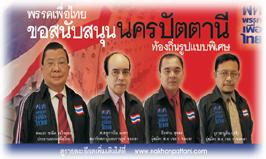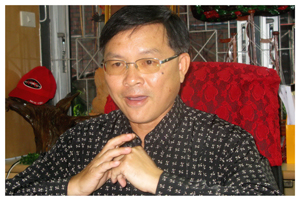Government’s about-face on decentralization a setback for southerners’ aspiration
 “Disappointing!” So said Associate Professor Dr Sombat Yothathip, dean of Humanities and Social Science Faculty of Ratchaphat University’s Yala campus, when asked by the Isra news desk about how he felt with the government’s policy on the southern unrest problem.
“Disappointing!” So said Associate Professor Dr Sombat Yothathip, dean of Humanities and Social Science Faculty of Ratchaphat University’s Yala campus, when asked by the Isra news desk about how he felt with the government’s policy on the southern unrest problem.
The government’s policy statement which was delivered by Prime Minister Yingluck Shinawatra to the parliament on August 23 lists the southern unrest problem as one of its 16 urgent policies. As for the unrest problem, the policy statement says, in essence, that the government promises to promote local administration model which is correspondence with geographic characteristics.
An expert on the unrest problem in the three southernmost provinces, Dr Sombat said that the Yingluck government must not repeat the same blunder committed by the Thaksin administration when it decided to dissolve the Southern Border Provinces Administration Centre and Task Force 43 in 2002 hoping that this will help improve the situation.
Instead the dismantling of SBPAC and Task Force 43 left a huge vacuum of power in the deep South. Troops were withdrawn and they were replaced by local police and defence volunteers who were unproven to be incapable of controlling the situation. The disbandment of SBPAC left non-military development efforts in tatters because local agencies could not coordinate development works themselves and also they were inadequately equipped to do the job.
“ I think we have not forgotten the famous words: ‘lousy bandits’ by ‘someone’ in reference to the militants,” said Dr Sombat apparently referring to Thaksin who, several years, back called the militants ‘lousy bandits’.
Decentralisation, he said, has always been the aspiration of all Thai citizens, not just the residents in the three  violence-prone southernmost provinces. A few models of local administration and governorance, including Nakhon Pattani and Maha Nakhon Pattani, have been widely discussed on numerous occasions in the region although there is no conclusion yet about the most favoured model.
violence-prone southernmost provinces. A few models of local administration and governorance, including Nakhon Pattani and Maha Nakhon Pattani, have been widely discussed on numerous occasions in the region although there is no conclusion yet about the most favoured model.
Citing the special local administration model proposed by a working committee of the King Prachadhipok Institute, Dr Sombat said that there were two schools of though regarding the proposal. One side is in favour of a special administration similar to Bangkok Metropolitan Administration with an elected governor by the people while the other side is happy with the existing local administration model with the Tambon Administrationi Organisation and Provincial Administration Organisation.
The professor however reminded that for the three southernmost provinces to be capable of self determination each of them must be self-supporting which means that each of them must have sufficient financial support.
Asked about the election of the governor for Nakhon Pattani as envisaged by the Nakhon Pattani model of special administration, Dr Sombat admitted that he could not figure out whether the Pheu Thai party’s election defeat in the region could be interpreted that the local people did not endorse the Nakhon Pattani concept.
He proposed a three-stage decentralization of the administration of the far South with the first five years being devoted for massive brain-storming until there is a conclusion about the model which is acceptable to all stakeholders. The second stage from the 6th to 10th years calls for implenetation of the model of decentralization in selected districts of provinces. The final stage is for full emplementation of the model in all three provinces.
Abdul Shagoon bin Safi-e, an assistant manager of a religious school in Chana district of Songkhla, recently wrote a commentary in response to the government’s apparent about-face on the Nakhon Pattani concept of local administration.
“I still remember the image of Prime Minister Yingluck Shinawatra covering her head with a red hijab and holding a baby in the midst of southern Muslim women. She announced that the government’s policy was to make the far South a special administration like Bangkok Metroplitan Administration or Pattaya City Administration.”
 “But not a single Pheu Thai candidate won the election in the far South. Hence, words went around that the Pheu Thai party does not have the legitimacy to introduce the special administration model into the region,” wrote the religious teacher.
“But not a single Pheu Thai candidate won the election in the far South. Hence, words went around that the Pheu Thai party does not have the legitimacy to introduce the special administration model into the region,” wrote the religious teacher.
Personally, he believes that if the ruling parties does not have the legitimacy to introduce the special administration model, for instance Nakhon Pattani, into the region, then the party will have no legitimacy to implement the other urgent policies such as the 300 baht minimum wage, the 15,000 starting salary for graduates with a bachelor’s degree or the 15,000 baht per twien rice mortage scheme.
Mr Abdul Shagoon bin Safi-e maintains that the government must push ahead with decentralization of local administration in a manner which is in harmony with local customs provided that all stakeholders are allowed to take part in the discussion and decision-making process.
As for the local administration model to be adopted by the government, he suggested that the government takes into consideration the models already widely discussed, especially the model agreed upon by a network of 23 non-governmental organizations in the South.
The religious teacher stressed that it is important for people outside the three southern most provinces to be informed that the special administration model is just a form of decentralization of local administration and has nothing to do with separatism. It is about self-determination as enshrined in Section 281 of the Constitution, he said.
